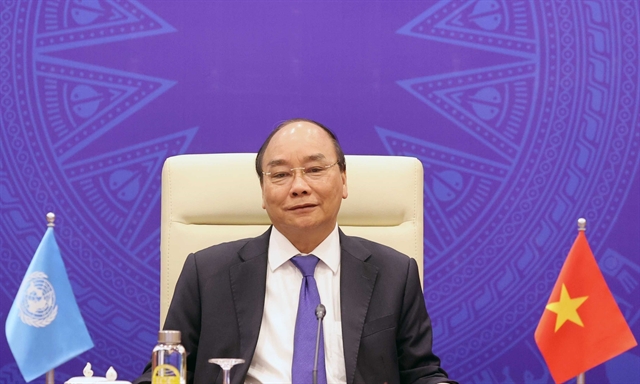
HÀ NỘI — In his capacity as President of the United Nations Security Council in April 2021, Vietnamese State President Nguyễn Xuân Phúc will preside over a high-level open debate on enhancing cooperation between the UN and regional and sub-regional organisations in promoting confidence-building and dialogue in conflict prevention and resolution.
The UNSC’s meeting will be held on April 19 in both in-person and online forms, according to the Ministry of Foreign Affairs.
Việt Nam for the second time assumed the role of rotating President of the UNSC in the 2020-2021 tenure this month.
On April 1, the UNSC adopted the April Programme of Work proposed by Việt Nam, under which the council will hold 15 open debates and 10 closed meetings discussing various peace and security matters in the world, including situations in the Middle East, Syria, Libya, Yemen, Sudan, South Sudan, Mali, West Sahara, Colombia, and Kosovo.
Việt Nam is scheduled to chair four video-teleconferencing (VTC) open debates this month, with the first taking place on April 8 addressing the “Maintenance of international peace and security: Mine action.”
There will also be debates on “Women and peace and security: Sexual violence in conflict” on April 14, and “Protection of civilians in armed conflict: Indispensable civilian objects” on April 27.
More support for victims of sexual violence in conflict
Ambassador Đặng Đình Quý, Permanent Representative of Việt Nam to the UN, has called on the international community to further support victims of sexual violence in conflict.
The victims should be assisted to access psychological, medical, training and legal services, integrate into the community and seek livelihood sources, Quý said while chairing an open debate of the UN Security Council (UNSC) on women, peace and security on Wednesday.
The virtual debate is one of the initiatives raised by Việt Nam within its capacity as President of the UNSC in April.
Quý expressed his concern over sexual violence in conflict as well as its impact on victims, particularly women and children, emphasising the need to take a comprehensive approach to the problem.
Such an approach should not only include timely assistance for victims, but also measures to address the root causes of sexual violence in conflict, he said.
Preventing such violence also requires the full and equal participation of women in decision-making and peace processes, Quý said.
While states bear primary responsibility to address sexual violence, the international community, and the UN system in particular, can provide much-needed development assistance, capacity-building, technical support and training, he said.
In that regard, he called for sexual violence prevention and response to be incorporated in peacekeeping mandates and for more women to be deployed in peacekeeping missions to work closely among communities on the ground.
Addressing the meeting, Pramila Patten, Special Representative on Sexual Violence in Conflict, said there were over 2,500 UN-verified cases of conflict-related sexual violence in 18 countries last year alone.
She affirmed that now was the time to “take stock of both the persistent and entrenched, as well as new and emerging, challenges…to eradicate the scourge”.
UNSC member countries thanked Việt Nam for promoting dialogue on the humanitarian and urgent issue, and affirmed their commitments to preventing and putting an end to sexual violence in conflict. — VNS